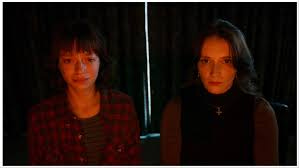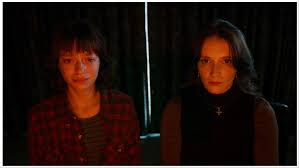To describe Pascal Plante’s Red Rooms as a courtroom thriller is technically accurate, I suppose, but such an appellation doesn’t begin to get to the heart of the film. A good chunk of it takes place in a courtroom during a sensational murder trial but these scenes tend to focus more on the minutiae of procedure than on the kind of sensational revelations one normally expects from such things. Likewise, it has the form of a thriller but it doesn’t offer up the usual features found there either—there are no elaborate action sequences and while there are moments of horrifyingly brutal violence, they are all kept off-screen as well. Instead, it finds an intriguing new approach to the genre and while it may not prove to be everybody’s cup of tea in the end, it provides the kind of gripping moviegoing experience whose most intense moments will stick in the mind long after the empty thrills of most other films of its kind have faded away.
Set in Montreal, the film revolves around the trial of Ludovic Chevalier (Maxwell McCabe-Lokos), a man so utterly anonymous in his look and manner that even sitting in court in an isolation booth, he hardly seems to even be there. And yet, this innocuous-looking man has been accused of a particularly heinous crime—not only is he suspected of brutally murdering three teenage girls between the ages of 13 and 16, it is believed that he actually recorded the murders in order to distribute the footage in the ugliest corners of the dark web. As the opening arguments are presented, it seems that the prosecution has the upper hand—they have the girls’ bloody clothing that was found buried on his property and even though the person committing the murders on the two videos that recently turned up (the third one having not yet been found) is masked, technical experts believe that a random shot of the killer’s eye can prove that it was Ludovic behind the mask. Although the defense initially seems hopeless, it does make a couple of key points—the technology being used to identify the eye is not always reliable and much of the other evidence, while initially damning, cannot be specifically tied to Ludovic.
As what tends to be the case with many high-profile murder case, the trial has attracted a number of people who jockey to arrive at the courtroom first thing every day—sometimes sleeping in the street—in order to guarantee a seat as an observer. One of them is Clementine (Laurie Babin), a young woman who has clearly developed some kind of infatuation for Ludovic and is will to go on at length to anyone who will listen (and even those who don’t) about how he is innocent and how the government has clearly manufactured all the evidence being used against him. By contrast, Kelly-Anne (Juliette Gariepy), a fashion model who supplements her income by playing online poker, is not so overt in declaring her particular fascination with the case—buttonholed by a TV news camera crew at the conclusion of the trial’s first day, all she can offer up in the way of explanation is that the case seemed interesting to her.
The two women form a strange but instant kind of bond right from the outset and Kelly-Anne even invites Clementine to stay with her at the spacious-yet-sterile apartment that she has tricked out with a custom-programmed AI computer system that offers everything from complex data analysis to dad jokes. As we spend time together with the two outside of court, it becomes clear that Clementine is not just playing for the cameras—she is genuinely convinced of Ludovic’s innocence, even going so far as to call into to a live talk show to castigate the panelists for making jokes about him, and is convinced that a viewing of those recovered murder videos would prove it for sure. By contrast, Kelly-Anne never lets on about what her particular interest in the case might be but as we see her by herself as she scours the web in hopes of finding that elusive third tape, even as her constant presence at the trial begins wreaking havoc with her modeling career, it becomes clear that she is being driven by some unspoken compulsion that could ultimately prove to be even scarier than Clementine’s more overt actions.
At its heart, Red Rooms is essentially two different movies and, to put it mildly, I vastly preferred one to the other. The lesser of the two is a procedural thriller in which Kelly-Anne uses her incredible skill set in order to delve deeper into the case while not in the courtroom. This stuff is executed with a certain flair and style, to be certain, but some of it stretches the bounds of credulity at times. For one, between being a model, a poker expert with a keen sense of knowing when to hold and/or fold ‘em, and a virtual computer savant able to work miracles with a few taps of the keyboard, there are times when Kelly-Anne feels less like a plausible person and more like someone trying to create a Lisbeth Salander clone in order to launch a new series. Her apparent ease at navigating the internet in order to come up with the kind of information that has thus far eluded the authorities officially investigating the case also has a tendency to feel more like a convenient plot device as well.
However, it is when Plante moves away from the more familiar genre parameters into relatively uncharted territory—namely the exploration of what is going on in the minds of those who line up to attend murder trials and form inexplicable attachments with those accused of committing the worst crimes imaginable—that Red Rooms begins to generate a quiet and unshakable power. When we are first introduced to Kelly-Anne and Clementine, we sort of expect that the focus will be on the latter because she more closely conforms to our ideas of what so-called “murder groupies” are like with her outspoken, borderline manic insistence that Ludovic is innocent, even willing to make a public spectacle of herself to make her point. However, that avenue is defiantly short-circuited by Plante in a brilliantly staged and played scene in which Clementine gets a chance to see one of the videos that she has insisted will exonerate Ludovic with her own eyes—instead of showing any of the actual footage, we merely look at her looking at it and see those illusions slipping away as the atrocities play out in front of her. Until this point, the character has been kind of obnoxious (deliberately so, obviously) but after this, we begin to find sympathy for her as well through her quietly shattered response and begin to realize just how impressive Babin’s performance has truly been throughout.
Meanwhile, it is the ostensibly normal Kelly-Anne who becomes gradually more unnerving as things progress. With a glamorous job and evidently no immediate money concerns, she seems to be an anomaly amongst the courtroom observers. As the story goes on, it slowly becomes evident that even though she may not be as demonstrative as Clementine, she is even more laser-focused on the case and on Ludovic, even going so far as to essentially tune out the outside world (with the soundtrack dominated for long stretches with a loop of bits of dialogue from Shiva Baby) while putting her career in jeopardy to spend her days observing the trial and nights in search of that elusive third tape in the darkest corners of the internet. What exacerbates the tension to an almost unbearable degree at times is that the film does not let on as to why she is doing all of this and what she hopes to accomplish if she does find the tape—will she use it to prove Ludovic’s guilt or innocence or, having already watched the other videos without freaking out in the way that Clementine did, does she want to acquire it for more personal and potentially unspeakable reasons? Thanks to Gariepy’s flawless performance, all possibilities remain open until the very end and as a result, there is never a point during the film where anyone can honestly say that they know where the story is going.
Not surprisingly, the only time that Red Rooms begins to falter is towards the very end, when some, if perhaps not all, of the questions are finally answered and the story is wrapped up in a manner a little too abrupt for my tastes. Until then, the film works as both a dark psychological thriller and as a meditation on the obsession with transforming heinous crimes into entertainment product that has exploded in recent years with the advent of true crime podcasts and streaming service miniseries. To be certain, while the on-screen violence is kept to an absolute minimum, the darkness that Plante is still able to conjure up is so great that it might prove to be too much for some viewers to bear. However, if you don’t mind squirming in your seat a lot, Red Rooms should prove to be one of those films that sticks in the mind, even if you would prefer that it didn’t




